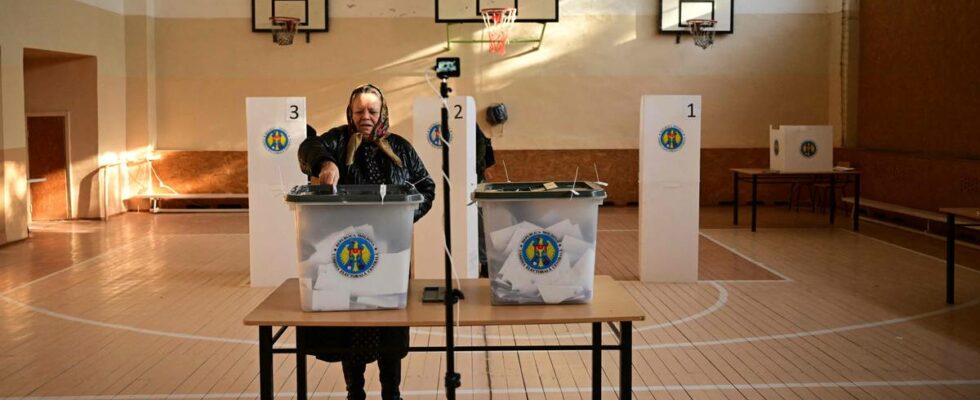Sandwiched between Ukraine and Romania lies tiny Moldova, with its 2.4 million people, gilded church spiers and vineyards. And drug, arms and human trafficking. This is the country that has found itself in the middle of a tug-of-war between the EU and the West on one side, and Russia and Austen on the other. Today, the people of Moldova cast two votes. The one on who will be the country’s president for the next four years. The second on whether Moldova should take a big step forward towards EU membership. The election is called a crossroads between east and west. Should the people of Moldova choose the incumbent Prime Minister Maia Sandu and her path towards EU membership and Western alliances, or let the pro-Russian part of the population win and give power to someone who wants to take the country in the opposite direction? Moldovan President Maia Sandu casts her vote in the election. Will she still be president after the results are tallied? Photo: Daniel MIHAILESCU / AFP The Helsinki Committee: – Buys votes – One thing that makes Moldova a dangerous country is precisely that it is so corrupt and poor. It makes it much easier to buy electoral votes, for those who want to, says Arve Hansen of the Norwegian Helsinki Committee, and adds: – And as small as the country is, there are not many votes you need to buy before you actually influence the outcome. This past spring, the customs officials at Chisinau airport caught more than 100 passengers who came from Russia via Armenia, all of whom had just under 10,000 euros in cash. Amounts of more than 10,000 euros must be declared to the customs authorities. The money was to be used to buy electoral votes against Sandu and the EU. This is being described as the start of what the Moldovan authorities have called an “unprecedented destabilization campaign” from the Russian side. Russia seeks to interfere in the politics of Moldova, writes the BBC. Presidential candidate Alexandr Stoianoglo at a polling station in Moldova today. Photo: Vladislav Culiomza / Reuters Propaganda campaign The government announced earlier in the year that it would provide NOK 350 million in aid to Moldova through the so-called Nansen programme. Foreign Minister Espen Barth Eide has been to Moldova twice this year, most recently this week. – Russia is now running a huge campaign to try to influence countries in Eastern Europe to become more Russian-friendly again. There is a lot of evidence of buying votes, manipulation of information and smear campaigns against incumbent governments, says Foreign Minister Espen Barth Eide. In particular, the fight against “LGBT ideology” is used diligently by Russia, which knows that both skepticism and aversion to homosexuality are widespread in Moldova. – There is a lot of propaganda that tries to appeal to a more traditional culture in the countryside, by saying that in the EU you have to celebrate pride all the time and have a lot of gay-friendly laws, says Eide. The Helsinki Committee has worked with the LGBT community and hate crime in Moldova for many years, says Hansen. He believes it is no coincidence that the LGBT movement has become the scapegoat: – It is their way of linking the EU issue to a larger ideological comb. They want to portray it as Russia representing the traditional, Christian and correct, while the EU is degenerate and homosexual. Election workers ask for a “mobile” ballot box with them when they visit voters in Moldova. Photo: Vladislav Culiomza / Reuters – A money laundering hub But why should two of the world’s great powers care so much about what is, despite everything, one of Europe’s poorest countries? There are several reasons for this. A quick search on Google Maps reveals the first and perhaps the largest. The country has a 1,200 km border with Ukraine. – They are very interested in how things are going in Ukraine now. If things go badly for them, they fear that they will be next. In the same way, Ukraine, and Europe to that extent, is concerned that Ukraine should not get a Russian protectorate to its west, says Eide. Since Moldova is not part of the EU, the country is exempt from many economic regulations. – In combination with poverty and corruption, it has turned the country into a money laundering hub for parts of Europe. Money flows from Russia via Moldova to Great Britain and the Baltics. This is a favorite country for several of the Russian oligarchs, says Hansen. In addition, a large part of the drug, arms and human trafficking that takes place in Europe goes through Moldova. – All this easily spreads to other European countries. This is probably one reason why the EU is very keen to include Moldova in its regulations, says Hansen. Many from Moldova who live in Russia also cast their vote in the election. These had met at the embassy in Moscow. Photo: Evgenia Novozhenina / Reuters Published 20.10.2024, at 19.27 Updated 20.10.2024, at 20.10
ttn-69
Elections in Moldova – news Urix – Foreign news and documentaries

